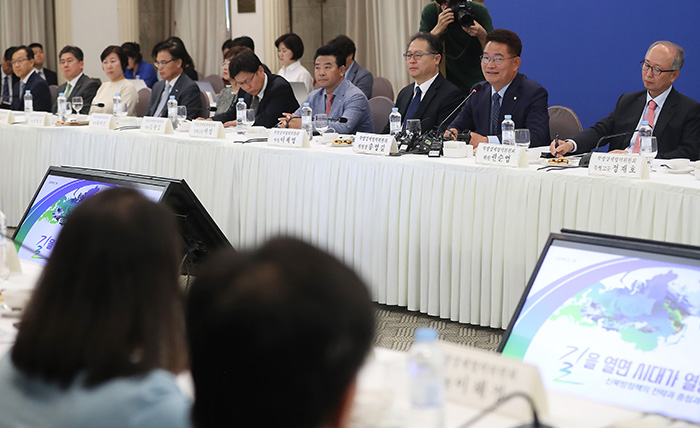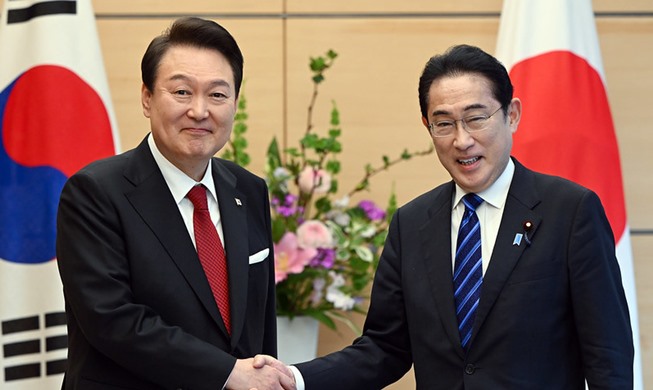-
 Korea.net's 24-hour YouTube channel
Korea.net's 24-hour YouTube channel- NEWS FOCUS
- ABOUT KOREA
- EVENTS
- RESOURCES
- GOVERNMENT
- ABOUT US

Chairman Song Young-gil (second from right) of the Presidential Committee on Northern Economic Cooperation speaks during a general meeting at the Korea Press Center in Seoul on June 18. (Yonhap News)
By Sohn JiAe
Amid high expectations for Korea’s northern economic cooperation with neighboring countries, like North Korea, Russia and China, spurred by the latest series of dramatic developments on the Korean Peninsula following inter-Korean talks and the U.S.-North Korea summit, the Korean government has announced a new set of strategies and core tasks that make up its New Northern Policy.
The Presidential Committee on Northern Economic Cooperation announced on June 18 four goals and 14 priorities to facilitate the New Northern Policy. As part of the initiatives, the government will pursue the development of exclusive industrial zones along its bordering areas -- North Korea, Russia and northeastern mainland China -- making them a part of a project for economic cooperation across Northeast Asia. This initiative links President Moon Jae-in’s new economic map for the Korean Peninsula with Beijing's strategies to promote its three northeastern provinces and with Moscow's New Eastern Policy.
Part of this goal is to develop economic zones that connect Sinuiju, North Korea, with Dandong across the Amnokgang River in Liaoning Province, China, that connect Naseon (Najin), North Korea, with Hunchun across the Dumangang River in Jilin Province, China, that connect Naseon to Khasan, Russia, and, also, that open the Khasan-Naseon railway line.
There’s a plan to facilitate more transactions between the countries involved through railroads and shipping, by reducing railroad fares for Russia Railways and the Trans-Siberian Railway (TSR), running a block train exclusively for Korean companies, and constructing the Donghae Bukbu Line earlier than scheduled, a train line that links Gangneung to Jejin Station in Goseong-gun County in North Korea's section of Gangwon-do Province.
In addition, the government will make efforts to establish a super grid for higher volumes of electricity among the two Koreas, China, Japan and Russia, carry out joint research into a trans-Korea gas pipeline with Russia, and develop the North Pole Route, a shipping route that links Europe to East Asia.
Joint projects with Moscow will increase, as well.
Korea will join forces with the Russian government across the areas of technology, business and science, as it will put in place an innovative platform to create new industries and revitalize bilateral exchanges among startup businesses. The two countries will also establish a new Korea-Russia innovative center and expand and reform the existing Korea-Russia Science Technology Cooperation Center in Moscow.
jiae5853@korea.kr
Most popular
- China warmly welcomes first Korea-born giant panda Fu Bao
- First hearing-impaired K-pop act hopes for 'barrier-free world'
- Novelist Hwang's 'Mater 2-10' shortlisted for Int'l Booker Prize
- Expats could account for 7% of population in 20 years: report
- Nat'l Fire Agency picks 137 elite staff for deployment abroad













